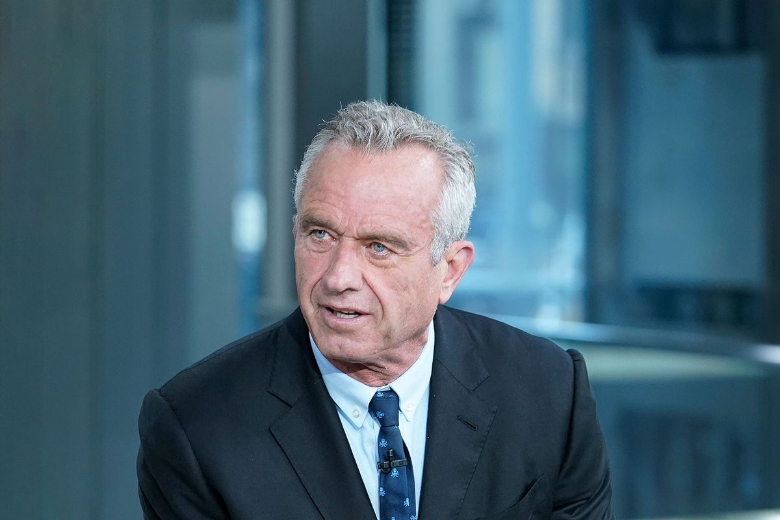Robert F. Kennedy Jr. is intensifying his campaign to confront what he describes as “agency capture” by Big Pharma and restore transparency to the healthcare system. If elected, Kennedy pledges sweeping reforms that target pharmaceutical advertising, vaccine safety data, and alleged collusion between medical journals and drug companies.
Kennedy’s first target is Big Pharma’s extensive influence over U.S. media. Currently, the U.S. and New Zealand are the only two countries that permit direct-to-consumer pharmaceutical ads on television. Kennedy argues that this advertising is not only driving up healthcare costs but also impacting public health.
“With a stroke of the pen, you can change back the rule that allows pharmaceutical advertisers to do direct-to-consumer ads on television. That’s one of the big problems,” he stated, adding, “75% of the revenues for those evening news shows, or, you know, Anderson Cooper, is coming from Pfizer and other pharmaceutical companies.”
Kennedy emphasizes that these ads give Big Pharma disproportionate control over public information, as networks rely on pharmaceutical advertising dollars. According to him, this has contributed to higher drug costs and poor health outcomes in the U.S., despite Americans spending more on pharmaceuticals than citizens in other countries. “We spend three times more than any other country for pharmaceutical drugs because of all this advertising,” he explained, noting that “we have the worst health outcomes.”
In addition to targeting ads, Kennedy vows to make vaccine safety data more accessible. He has committed to unlocking the Centers for Disease Control and Prevention’s (CDC) vaccine safety database, which he claims contains critical information on vaccine side effects and correlations with conditions like diabetes, peanut allergies, and neurological disorders.
“They keep that data in a lockbox like Fort Knox,” Kennedy remarked. “On day one, I’ll open up that database.”
According to Kennedy, access to this data would allow Americans to make better-informed decisions about their healthcare. He argues that the government’s current approach to vaccine safety data limits transparency, thereby undermining public trust.
Kennedy also intends to address what he calls “racketeering” between medical journals and pharmaceutical companies. He has set his sights on major journals such as The New England Journal of Medicine, The Lancet, and JAMA, accusing them of misleading the public by aligning with Big Pharma’s interests. Kennedy claims these journals play a central role in promoting biased research that serves the pharmaceutical industry’s goals, often at the expense of public health.
“You guys are part of a racketeering syndicate. You’re collaborating with these pharmaceutical companies to lie to the American public about the efficacy and safety of these products,” he stated. “We are going to sue you both civilly for damages, and we’re going to sue you criminally.”
By taking legal action, Kennedy hopes to shift the power dynamics in medical research, ensuring that medical journals prioritize the public’s right to accurate information over financial incentives.
Kennedy’s vision for healthcare reform extends beyond advertising restrictions and legal action. He has compiled a “to-do list” with 100 points, aimed at dismantling what he sees as the pharmaceutical industry’s outsized influence over the government and healthcare system.
At the core of Kennedy’s platform is his belief that the President possesses sufficient authority to enact these reforms without congressional approval. “I’m not intimidated by the agencies. I know how they work, and I know how to change them, and most of those changes, you do not need Congress for the President,” he asserted.
Kennedy is also critical of previous administrations for failing to act. He argued that both President Biden and former President Trump had the power to curb Big Pharma’s influence but opted not to use it.
“They had the authority, but they chose not to act,” he stated. “I intend to use that authority to its fullest extent.”
Kennedy’s proposed reforms have drawn both praise and criticism. Supporters argue that his approach is long overdue, pointing to the high cost of pharmaceuticals in the U.S. and the healthcare system’s often opaque practices. Detractors, however, warn that Kennedy’s agenda could disrupt partnerships between the government and healthcare industry, potentially leading to unintended consequences.
For Kennedy, these criticisms are outweighed by his commitment to what he calls “unraveling the agency capture” that has plagued American healthcare. He has pledged to reduce Big Pharma’s grip on regulatory agencies, restore trust in the healthcare system, and prioritize public health over corporate profits.
Kennedy’s proposals mark a significant shift from traditional healthcare reform efforts, emphasizing executive action and transparency as key tools. By tackling pharmaceutical advertising, increasing vaccine data transparency, and holding medical journals accountable, Kennedy aims to reshape the relationship between government, media, and the pharmaceutical industry.
As the election approaches, Kennedy’s plan is poised to be a central point of debate, with many wondering whether his ambitious agenda can gain the political traction needed to bring about real change in U.S. healthcare.
.@RobertKennedyJr outlines his plan to eliminate pharmaceutical ads on TV, ensure transparent access to federal health databases, and put an end to corrupt practices within the medical journal industry.
“I’m not intimidated by the agencies. I know how they work and how to change… pic.twitter.com/HBgbTxz8bj
— KanekoaTheGreat (@KanekoaTheGreat) November 15, 2024

